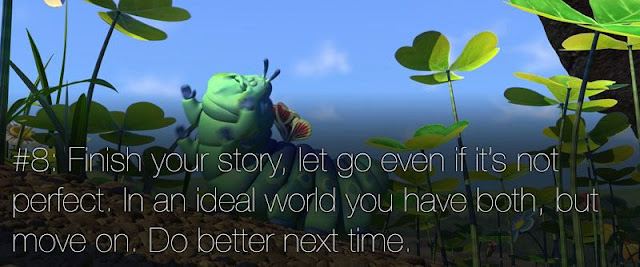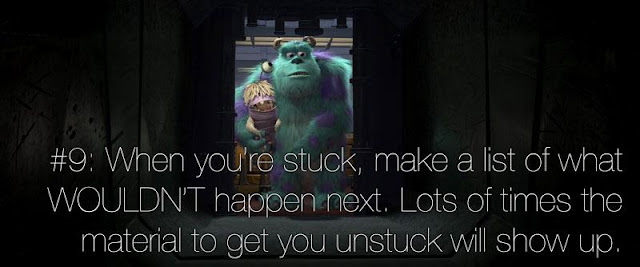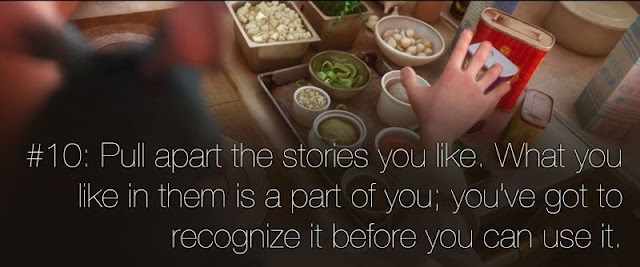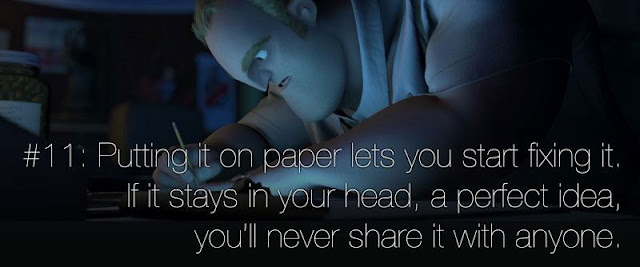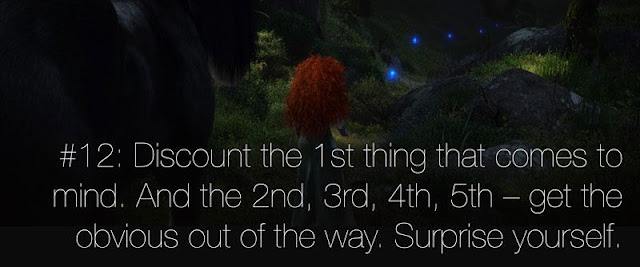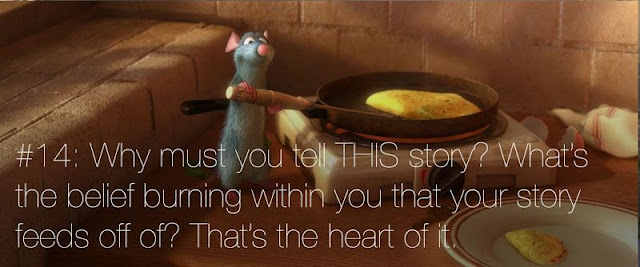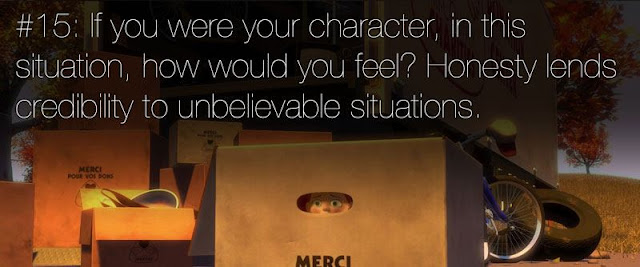Category: ideas
June 30, 2017
Puppy Monkey Baby
Pushing this one up to the wire, but it’s technically still Thursday.
Somewhere…
So, there’s an author I follow on Twitter (she wrote one of my favorite books I read last year), and she was recently grumbling about something she’d run across. “I’m tired of the ‘everything sucks’ genre of fiction. We’re all corporate drones and suckers for advertisements – I get it.”
I remember sighing, because I knew just what she was talking about. I think we’ve all run into this sort of writing. The big-idea, big-character moment stories. Often—not always, but often—they’re stories that are so beautifully “real.”
A standard element in this type of writing is when a character has an epiphany—either on their own or pushed on them. A supposedly world-altering revelation about their life. About life in general—everyone’s life.
 I say “supposedly” because most of them are the sort of simple life lessons most people have figured out by… I don’t know, the time we turn twenty? Somewhere around there? That it’s better to be healthy and loved than to be cool or rich. That sometimes we have to compromise our beliefs to achieve certain goals. That big multinational corporations may have an agenda that doesn’t involve my personal health or financial prosperity. That advertising is trying to get us to buy stuff. Y’know, those sort of things.
I say “supposedly” because most of them are the sort of simple life lessons most people have figured out by… I don’t know, the time we turn twenty? Somewhere around there? That it’s better to be healthy and loved than to be cool or rich. That sometimes we have to compromise our beliefs to achieve certain goals. That big multinational corporations may have an agenda that doesn’t involve my personal health or financial prosperity. That advertising is trying to get us to buy stuff. Y’know, those sort of things. Minor aside. Can you imagine if I was bragging to someone about having cereal for breakfast? And—not to overlook this point—I prepared it! With no help from anyone. I didn’t even watch any YouTube instructional videos. I just grabbed that box, shook some Captain Crunch into the bowl, and poured on the milk.
I even fed myself. With a spoon and everything. I’m just that good.
Let’s stop and consider for a moment. Is this really an accomplishment I should be boasting about? That I should be particularly proud of? It’s like congratulating someone for having a stripper at their Las Vegas bachelor/ette party–so many people do it, it’s almost taken as a given.
Let’s stop and consider for a moment. Is this really an accomplishment I should be boasting about? That I should be particularly proud of? It’s like congratulating someone for having a stripper at their Las Vegas bachelor/ette party–so many people do it, it’s almost taken as a given.
And if this was the “big thing” you’d been going through two hundred pages to find out…?
I can’t help but think a lot of these moments get put in for one of two reasons. Well, really the same reason, just approached from two different points of view.
One is the kind of innocent one, The writer’s including this amazing revelation because they don’t grasp that everybody has these moments. The vast majority of people assume they’re “normal.” That everyone thinks the same way I do and knows the same stuff I know. So if I make a sudden discovery about the world, it kinda stands to reason that nobody else knew about this. Even if it’s something like “Whoa—did you know Stan Lee is in every one of the Marvel movies?”
 The other one is… okay, it’s the same one, but with a lot more attitude. Now the writer assumes that nobody has everknown this. They—and they alone—had the brilliance to spot this, and they’ve graciously decided to share their brilliant insight into the world with all those folks of lesser intelligence. This is when it’s suddenly “Most people don’t catch it, but Stan Lee is the bartender in Ant Man and also the delivery man in Civil War.”
The other one is… okay, it’s the same one, but with a lot more attitude. Now the writer assumes that nobody has everknown this. They—and they alone—had the brilliance to spot this, and they’ve graciously decided to share their brilliant insight into the world with all those folks of lesser intelligence. This is when it’s suddenly “Most people don’t catch it, but Stan Lee is the bartender in Ant Man and also the delivery man in Civil War.” Of course, as I said before, normally they’re not talking about Stan Lee cameos. We’re talking about priorities. We’re talking about the industrial complex. We’re talking about multimedia, like advertising and Twitter and random blog posts!
*ahem*
*ahem*
In a way, this is the flipside of an empathy issue I’ve mentioned here a few times. I even mentioned it up above. Sometimes, as a writer, I make the mistake of assuming that everyone knows all the same things I do—that they’ll get all my jokes and references. In this case, I’m assuming I found something all-new that nobody’s ever seen before.
My lovely lady friend came up with a term for this a while back, developed after many years of reading for screenplay contests. Simply put– it’s the moment when a baby discovers their own feet. It may be the coolest thing that’s ever happened in the life of the baby, but for the rest of us… well, it’s not quite as exciting.
Yeah, sure it is for the parents. But for everyone else? Can you imagine having your friends call you over to sit and watch their baby giggle at his or her toes for two hours?
 When a character figures out it’s more important to spend time with their loved ones than at work, they’re discovering their own feet. If someone comes to the jaw-dropping conclusion that they’ve messed up a life that was clearly messed up on page one, it’s their own toes they’re staring at. When someone realizes that bad things happen to good people and most other people don’t even care–OH MY GOD! The toes wiggle when I think about wiggling them!!!!
When a character figures out it’s more important to spend time with their loved ones than at work, they’re discovering their own feet. If someone comes to the jaw-dropping conclusion that they’ve messed up a life that was clearly messed up on page one, it’s their own toes they’re staring at. When someone realizes that bad things happen to good people and most other people don’t even care–OH MY GOD! The toes wiggle when I think about wiggling them!!!! This is one of the reasons I’m always encouraging people to read. I need to read in my genre, yeah, but outside it, too. All those best sellers and the bad stuff. I need to know what stories have been told, how they were told, and I need to have a good grasp of how well they’re know. This isn’t the 1820s anymore—it’s tough to be a writer and be disconnected from the world.
Because I really don’t want my big reveal to be that Ford’s top priority is selling trucks…
Next week, I’d like to give a belated sendoff to my favorite stewardess.
No, not a flight attendant. Back then, alas, she was considered a stewardess.
Until then… go write.
March 30, 2017 / 1 Comment
Can’t Find The Target
By odd coincidence, this is post 404.
There’s an old development saying you’ve probably heard—let’s throw it at the wall and see what sticks. The premise here is that if we use every single idea we have, surely the good ones will do something to get noticed. They’ll stick to the wall or rise to the top or… something.
 The unwritten part of this premise is that you’ll also end up with a serious mess. Yeah, my two or three good ideas stuck to the wall, but look at all the crap piled up on the floor under them. Hell, look at the wall itself. It’s all stained and smeared and streaked. This isn’t a clean-up situation, it’s a straight repaint. I can say with confidence that we’re not getting our security deposit back.
The unwritten part of this premise is that you’ll also end up with a serious mess. Yeah, my two or three good ideas stuck to the wall, but look at all the crap piled up on the floor under them. Hell, look at the wall itself. It’s all stained and smeared and streaked. This isn’t a clean-up situation, it’s a straight repaint. I can say with confidence that we’re not getting our security deposit back. With all that in mind, I’d like to tell you the story of Phoebe McProtagonist…
Phoebe struggled through life from an early age, born ten months premature on the same day her father died in the Middle East, one week before his two-year tour ended. Overwhelmed with grief, her mother committed suicide during the birth. Phoebe’s years as an orphan in child protective services left her hard and jaded, and she never had a single role model—growing up without parents, foster parents, inspiring teachers, sports heroes, pop icons, internet stars, or even a giving tree.
In high school, Phoebe struggled with drug addiction, alcohol addiction, adrenaline addiction, video game addiction, sex addiction, a hoarding problem, OCD, Tourette’s syndrome, and extreme boredom because she wasn’t being challenged (no inspiring teachers, remember). She got pregnant three times on prom night, couldn’t get any abortions because she lived in a red state, then suffered four miscarriages from drinking lead-tainted Jaegerbombs after graduation.
(alcohol addiction, remember?)
 Determined to honor the memory of her unborn children, Phoebe withdrew from society and home-grad-schooled herself, eventually receiving magna cum laude, perfect attendance, and a triple doctorate in music theory, film criticism, and genetic engineering. Thus armed, she applied to be an astronaut and, after months of rigorous testing, was finally accepted into the astronaut training program by those goddamned f@¢%!#g bastards at NASA.
Determined to honor the memory of her unborn children, Phoebe withdrew from society and home-grad-schooled herself, eventually receiving magna cum laude, perfect attendance, and a triple doctorate in music theory, film criticism, and genetic engineering. Thus armed, she applied to be an astronaut and, after months of rigorous testing, was finally accepted into the astronaut training program by those goddamned f@¢%!#g bastards at NASA. (Tourette’s, remember?)
But when the rest of her team was killed in a launchpad fire that also burned down her house, Phoebe took time off to sort out her life. She sorted it out, got her groove back, got her ducks in a row, realized what’s important, and was struck by lightning walking along the beach. As she sprawled on the shore, feeling a moment of divine bliss and agony as all the hair on her body burned away, giant mutant fiddler crabs came out of the ocean, the product of unregulated industrial waste dumping—
(red state, remember? See how it all ties together? That’s what good literature does!)
—and dragged her away into the water. In her final moments, the race between drowning and being eaten alive by the mutant crabs, she realized the single secret to clean energy, FTL travel, and how to make the perfect 7&7. But there was no one to tell before she died, because she walked the beach alone.
~The End~
Okay, that was maybe a little bit over the top, but you might be surprised how common this kind of storytelling is. I saw it in writers’ groups in college (part of the reason I don’t belong to such groups anymore) and countless times when I used to read for screenplay contests. You wouldn’t believe the number of dramatic stories that are just brimming with excess plot devices and story threads. Hell, I freely admit some of the early drafts of The Suffering Map were the same way.
This springs from a common misconception–that writing a bunch of plot points and character elements is the same thing as writing a story. The logic is that if I load up my story with every possible dramatic idea for every single character, one of them’s bound to hit the target, right? And then, eventually, the story will be dramatic. Plus, adversity builds character, therefore it stands to reason all this extra adversity in my story will make for fantastic characters.
I mean, Phoebe comes across a great character, right…?
Simple truth is, this is all just excessive. If I’m doing this, I’m wasting ideas and wasting words, using thirty or forty examples instead of just three good ones. It’s the kind of thing that tells a reader I was more interested in creating art than I was in telling any kind of decent story.
Of course, in all fairness, it’s not just the artsy literature types who do this, although I must admit, they seem to be the most common offenders. We’ve all read (or seen) the action storywhere every punch draws blood, every car chase ends with an explosion, and every leap rattles bones. Plus every character had a snappy one-liner to toss out (or at least think about) before, during, and after offing one of the villains. And there were lots and lots of villains…
Then there’s the sci-fi stories that have vast interstellar conflicts and near-magical technology and unstoppable cyborg monsters and omnipotent, cosmic beingsand sacred orbs Seriously, reading contest scripts I was so sick of orbs. I came to loathe the word. Know what else? Nobody in bad fantasy ever has eyes, they all have orbs.
Friggin’ orbs.
 And sooooo many horror story that have cubic yards of blood and gore everywhere. Plus there’s a little chalk-skinned child who moves in high-speed “shaky vision.” And a secret psychopath. And one person who snaps and gets dozens of people killed because they opened a door or invited something in or played with the puzzle box.
And sooooo many horror story that have cubic yards of blood and gore everywhere. Plus there’s a little chalk-skinned child who moves in high-speed “shaky vision.” And a secret psychopath. And one person who snaps and gets dozens of people killed because they opened a door or invited something in or played with the puzzle box. It’s been almost thirty years, people. Thirty. Years. Haven’t you figured this out yet? Nothing good comes from opening the damned puzzle box! Even my mom knows this!
Y’see, Timmy, whatever my chosen genre is, just loading a bucket up with plot elements and flinging them at the wall does not create a story. It’s the opposite of writing in just about every way possible. No, not even if I only consider the leftover stuff. As I mentioned above, all those other ideas are still going to leave stains and streaks, no matter how solid the good stuff is.
Take that as you will.
Next week I’ll talk a bit more about cons, and I might talk about excessive stuff a little more, too.
Until then, go write.
March 21, 2017 / 5 Comments
Scribbling
Okay, so here’s a simple tip. One you’ve probably heard before. One you’ve probably ignored until it’s too late.
Always carry a notebook.
Now, I know what some of you are thinking. A notebook. How quaint. How 19th century. What a delightful little writery affectation. I’m too young and vibrant to forget things. I’ve trained my mind to function like a steel trap!
Yeah.
You’ll forget stuff.
Back when I was in college, I was trying to write and drifting back and forth between a werewolf detective novel and another one I’ve mentioned here called The Trinity, about rival immortals. And I also had this idea dancing in my head. A scene with a few snippets of dialogue. Something about it called to me. Tickled me. Gnawed at me. It was one of those things I kept playing with, spinning it different ways, trying to find just how and where it would fit in a story. Or maybe a story that fit around it.
 So one night I was talking with a friend down at the dorm security desk and somehow ended up talking to a foreign exchange student. For, like, two hours. There at the desk. I don’t remember much about her except she had an amazing accent,very clever (hey, we talked for two hours), and was kinda stunning in that casual way some women pull off really well.
So one night I was talking with a friend down at the dorm security desk and somehow ended up talking to a foreign exchange student. For, like, two hours. There at the desk. I don’t remember much about her except she had an amazing accent,very clever (hey, we talked for two hours), and was kinda stunning in that casual way some women pull off really well. And about halfway through this conversation, I suddenly realized where that little scene fragment fit. Something she said flipped it around and I suddenly knew justhow this would work in a story. How it would be the seed of an entire powerful, amazing book.
But… I was having a fascinating conversation with an attractive foreign exchange student. I didn’t want to break that off. Besides—there was absolutely no wayI’d forget an idea this good.
Reader… I forgot it.
To this day, my most solid memory of that night is the sheer joy of knowing I’d figured out how to perfectly use that idea. I don’t remember how. Or the exchange student. But I remember how thrilled I was, knowing I’d finally get to use that idea.
I just don’t remember how.
Write it down. On a notepad. On your computer. On your arm. On your phone (there’s usually a notepad app, and there are some great ones out there you can grab cheap). Doesn’t matter if it’s an idea, an editing note, a clarification—always write it down somewhere.
But don’t tell yourself you’ll remember it.


